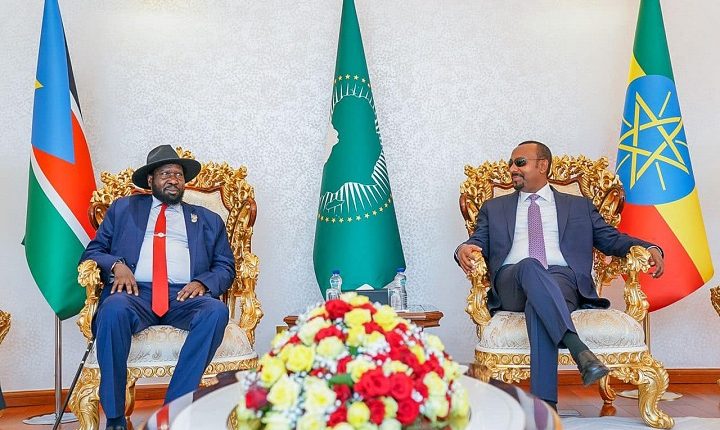Published
11 months agoon
By
Ugdiplomat
By Alex Masereka Joel
Ethiopia’s Prime Minister Abiy Ahmed has hailed the ratification of the Agreement on the Nile River Basin Cooperative Framework Agreement (CFA), also known as the Entebbe Agreement, by South Sudan as a historic diplomatic achievement.
This landmark decision marks a significant advancement in regional cooperation within the Nile Basin, fostering hopes for enhanced collaborative management of the vital water resources shared by the basin countries also known as riparian states.
“This is a historic moment for Ethiopia and the entire Nile Basin region,” declared Prime Minister Abiy Ahmed on X. “The ratification of the CFA by South Sudan is a significant step in our collective aspiration for regional cooperation. This diplomatic milestone will provide impetus for working towards the common good of our people through the establishment of the Nile Basin Commission.”
South Sudan’s Transitional National Legislative Assembly (TNLA) unanimously ratified the CFA last week making it the sixth country to do so. This now means the CFA will be effective on October 6, 2024 as it required six member countries to ratify the agreement for it to enter into force.
The development came just a month after Ethiopia hosted the 3rd AFRI-RUN summit, one that brings together Nile riparian states to promote dialogue on equitable and reasonable use of the river. It is organised by Ethiopia’s Institute of Foreign Affairs , Ministry of Foreign Affairs and Water and Energy Ministry.
At last month’s summit, there was a rallying call by participants for countries that are yet to ratify the important agreement, to do so in order to unlock the potential of the basin.
News of South Sudan’s ratification came as music to the ears of many along the Nile with pressure now on those yet to.
River Nile riparian countries include Burundi, Rwanda, Uganda, Kenya, Tanzania, South Sudan, Democratic Republic of Congo (DRC) (formerly known as Zaire), Sudan, Eritrea, Ethiopia, and Egypt.
The CFA has a complex history dating back to 1999 with the establishment of the Nile Basin Initiative (NBI) by the Nile Basin riparian countries. The NBI’s main objective has been to conclude a cooperative framework agreement that would incorporate the principles, structures, and institutions of the NBI and be inclusive of all Nile riparians. Work on the CFA, facilitated by the World Bank, the UNDP, and other donors, commenced immediately after the NBI’s formal establishment and continued for over a decade.
However, the process has not been short of challenges; hardening of the respective positions of the riparians over the Nile colonial treaties.
Despite these challenges, on 14 May 2010, four Nile riparians—Ethiopia, Tanzania, Uganda, and Rwanda—signed the CFA in Entebbe, Uganda. They were subsequently joined by Kenya and Burundi, raising the number of signatories to six.
The process of ratification of the CFA began in June 2013, four years after its signature, with Ethiopia being the first to ratify, followed by Rwanda in August 2013. Tanzania ratified the CFA in 2015, followed by Uganda in 2019. Burundi joined these riparians and ratified the CFA in 2023, critically raising the number of ratifications to five.
Ratification by South Sudan is seen as a crucial endorsement of the cooperative spirit envisioned by the agreement, which seeks to ensure that all member states benefit from the shared water resources while protecting the rights and needs of each nation. With Juba’s ratification, the commission is now a step closer to becoming operational, promising a new era of regional solidarity and collective action.
Prime Minister Abiy emphasized the importance of this development, highlighting that it sets a precedent for other Nile Basin countries to follow in addition to the diplomatic significance it carries.
“We believe this ratification will encourage other member states to embrace the CFA, fostering a unified approach to managing our precious Nile River. Together, we can achieve sustainable development and ensure the prosperity of our people,” he stated.
The Nile River, the longest in the world, is a critical resource for millions of people across multiple countries, including Ethiopia, Egypt, Sudan, Uganda, and now South Sudan. Effective management and equitable sharing of its waters are essential for regional stability, economic growth, and the well-being of the populations relying on its resources.


Inside Kakuru CEC Entrepreneurship Bid: What He Brings on Table


INTERVIEW: Calvin Echodu Vows To Revive Grassroots Politics and Fight Corruption in NRM CEC Bid


Eurasian Economic Union, A Unique Mechanism of True Partnership and Cooperation – Amb. Semivolos


Museveni Takes Charge of Great Lakes Peace Oversight, Vows Lasting Solution for Eastern DR Congo


Ssebunya Hands Over NRM Youth League Leadership in Nakaseke, Urges Active Youth Participation In Upcoming Structures


Seven UPDF Generals Documented for Retirement
